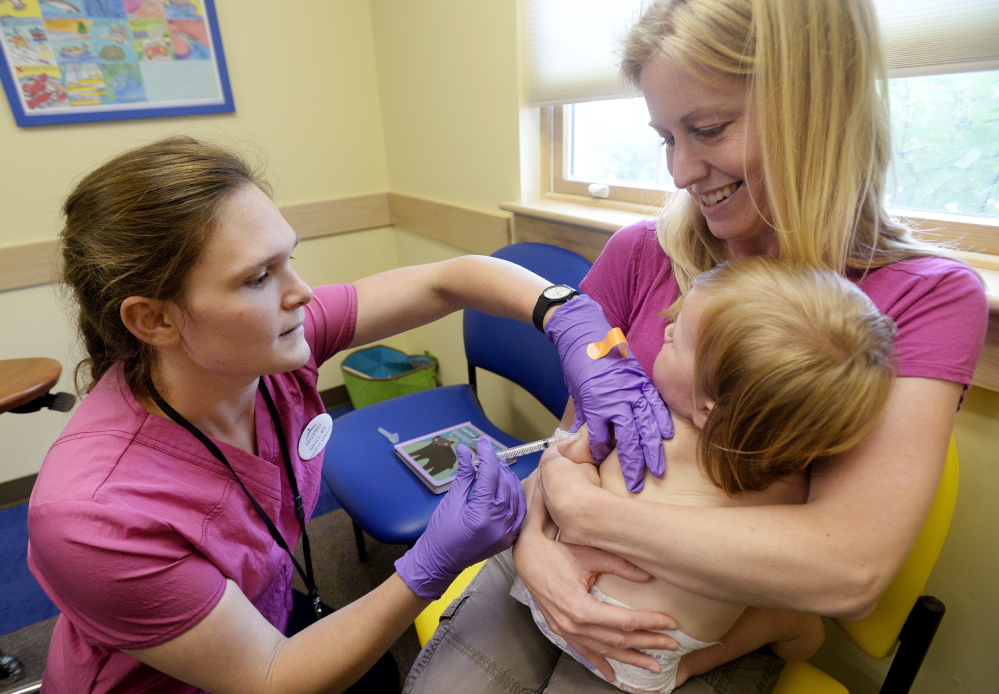The rate of unvaccinated kindergartners in Maine continues to climb and is now the fifth highest in the nation, according to a U.S. Centers for Disease Control and Prevention report released Friday.
The percentage of Maine parents voluntarily opting out of vaccines for their children is alarming state public health officials who have been working to bolster immunization.
Nearly 800 public school kindergartners in Maine started the 2013-14 school year without receiving the required vaccinations for diseases such as whooping cough and measles because their parents opted not to immunize. That represents 5.2 percent of all kindergartners in the state, up from 3.9 percent the previous year.
“This is mind-boggling to me,” said Amber Dugan, 35, of Durham, a parent of a 6-year-old boy and 18-month-old girl. Dugan said she vaccinates her children based on the federal recommendations. “I think, unfortunately, this is becoming a trend among mothers.”
Only Oregon, Idaho, Vermont and Michigan reported higher rates of unvaccinated children to the CDC than Maine. Kansas was the only other state that had a higher percentage increase in voluntary opt-outs.
While the reasons parents forgo vaccinations can vary, in Maine the increase in unvaccinated children is almost entirely because more parents are signing the “philosophic” exemption, an option permitted in 18 states. Among 796 opt-outs last school year, 766 signed the philosophic exemption and the other 30 cited religious reasons, according to the federal CDC.
Health experts have said some parents choose not to vaccinate because they fear a link between vaccines and autism, they’re worried about reactions caused by vaccines, or they don’t trust Western medicine for other reasons.
The anti-vaccination movement has persisted since the 1990s despite numerous studies proving vaccines are overwhelmingly safe.
“These are decisions that are made by parents that conflict with science,” said Trish Riley, adjunct professor of health policy at the University of Southern Maine. “It’s worrisome, and it puts all children at risk.”
While 5.2 percent may not sound like a high rate, states that have had more than 5 percent opt-out rates in recent years, such as Washington, Oregon and California, have experienced outbreaks of vaccine-preventable diseases such as pertussis and measles.
In 2012, Maine suffered its highest levels of pertussis, also known as whooping cough, since the 1960s with 737 cases. While whooping cough rates have declined some since then, they remain high compared with rates in recent decades. So far this year, Maine has had 339 cases of pertussis, already exceeding the 2013 total of 332 cases, the Maine CDC said.
Maine CDC Director Dr. Sheila Pinette said that while pertussis is “highly contagious,” citing unvaccinated children as the primary reason for the increase is unfair because the effectiveness of the pertussis vaccine has declined since the 1990s. She said the CDC now recommends 11-year-olds and those entering college receive pertussis booster shots.
Still, Pinette doesn’t like to see the unvaccinated rates increase, and her office is devoting more money and resources to public education, though late Friday afternoon she couldn’t provide details on how much the state was spending on those efforts.
“We are worried about the return of measles and other vaccine-preventable diseases,” Pinette said.
Having fewer vaccinated people puts the public at risk, experts say, because it breaks down “herd immunity,” which occurs when almost everyone is immunized. The “herd” protects infants too young to receive their vaccinations, people who can’t vaccinate for medical reasons, and those who received their shots but who are not as well protected because their bodies do not react properly to the vaccine.
Herd immunity can break down for some diseases when less than 95 percent of the population is vaccinated, according to the federal CDC.
Pro-vaccine advocates say they have been working since this summer to reduce Maine’s high opt-out rates. State Rep. Anne Graham, D-Yarmouth, is preparing legislation for the January session that would make it more difficult for parents to opt out of vaccines.
“I think the urgency is definitely there,” Graham said. “Everyone’s hair is on fire about Ebola, but these are vaccine-preventable diseases. My goal is to improve our educational efforts and increase our immunization rates.”
Graham said the bill will be modeled on a Washington state law that requires a medical professional to sign opt-out forms. The state reduced its kindergarten opt-out rate from 4.2 percent in 2012 to 3 percent in 2013, although Friday’s report showed an uptick for Washington to 3.6 percent in 2014.
Still, public health officials in Washington recently told the Press Herald that the law seems to be helping to reduce the number of unvaccinated children and tamp down outbreaks of preventable diseases.
Send questions/comments to the editors.




